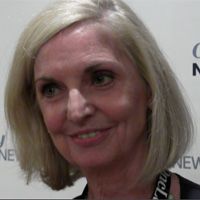Supporting Patients With Breast Cancer: Talking With Mary Ellen Diotalevi, RN
Mary Ellen Diotalevi speaks about her role as a nurse in a breast cancer center.
Mary Ellen Diotalevi, RN

Mary Ellen Diotalevi, RN
Mary Ellen Diotalevi, RN, has been a nurse for nearly 30 years, working in different departments. Now, she is a nurse practitioner in the Breast Center at the Smilow Cancer Hospital at Yale-New Haven—a position she says is her favorite.
Oncology Nursing News interviewed Diotalevi recently about her role as a nurse in a breast cancer center.
What are some of the biggest challenges that nurses working in this setting see on a daily basis?
The challenges are at the emotional level. I feel it’s our job as their nurse to be their shield. We’re there to protect them, we’re there to follow them through their journey, and we’re there to make it as comfortable and tolerable as possible—not only for them, but their families.
When patients are newly diagnosed, what are some of the concerns that they bring up right away?
How are they going to survive? How are they going to get through their treatment? What type of surgery should they have? It takes a team effort to respond to those concerns—including physicians, practice nurses, social workers, and also nurse coordinators.
Specifically, what are some of the challenges after a patient has had surgery?
Change in body image—that’s number one. They’re losing a part of themselves. So our job is to tell them that they’re really still a whole person. Plastic surgery reconstruction is done at the same time as surgery, if they do require mastectomy. Most of the time we see the tumors are able to be resected with a partial mastectomy. Patients usually do well with that type of surgery, so we’re there to tell them that they can continue on with their daily activities.
We’re there to prepare them for surgery, too, and to take care of them postoperatively. We’ll go over signs and symptoms of infection, tell them what they can and cannot do, and be there 24/7 to answer their questions, triage their calls, and talk to the surgeon about their issues.
What role do nurses play in talking with patients who have been told that they have a higher genetic risk of breast cancer?
We review their family history with them, along with the surgeon who will let them know; if we do feel that they should be tested, testing will be ordered.
The anxiety with that is that the results do take sometimes 2 to 3 weeks. Patients will call us, and we just try to reassure them that we are going to help them with their decision once they do get their results.
When they come back in, really it’s based on what they decide. The surgeon will tell them what is recommended, but it’s always the patient’s decision, what the next step in the approach will be, and patients also receive excellent counseling with the genetic team. Usually by the time the patient does come back to the center to talk about the surgical options, she’s already made up her mind and knows how she wants to proceed.
We’re not there to be judgmental. We’re there to guide them and help them with whatever they decide.
What do you focus on primarily with caregivers and family members?
When we’re in the room with a newly diagnosed patient and the surgeon is talking to them, it’s very important to see how the family member is dealing with it—when you see a husband shed a tear, or you see a husband looking away, or you’ll see a child or a young adult get really frightened, for example. As a nurse, you’ll go there and just sit with them and tell them again, you’re going to be there for them, to answer their questions. They’re part of their support network, and we also have social workers to help with the family dynamics.
What would be your advice for a nurse new to practicing in the breast cancer setting?
It’s okay to be scared, and it’s okay to be honest. But more important, you have to think about how the patient feels. So, try to be confident and observe, ask questions.
Why do you love being a nurse in the breast center?
Simply, I feel like I’m a nurse. I’m there to protect them and to guide them. I’ve been a nurse now since 1980, and this is probably my favorite position. I’ve been in management, I’ve worked with head and neck patients before, and I’ve been in surgical ICU. But to be a practice nurse, is amazing—to take care of them every day. Every day is different. It’s never the same.
And patients often come back to see us, just to say “thank you.” Patients are so appreciative, and they’ll tell you what you did to help them along the way. It’s special, to know that I’ve impacted their life, just a little bit.
Olaparib Plus Chemo May Not Improve Outcomes vs Chemo Alone in BRCA Wild-Type TNBC
April 23rd 2024Patients with BRCA wild-type triple-negative breast cancer treated with olaparib on a gap schedule with chemotherapy did not experience improved responses compared with chemotherapy alone in the neoadjuvant setting.
Nurse Practitioners Weigh in on Data From the San Antonio Breast Cancer Symposium
January 16th 2023Loyda Braithwaite, MSN, RN, AGPCNP-BC, AOCNP; and Jamie Carroll, APRN, CNP, MSN, highlight presentations from the 2022 San Antonio Breast Cancer Symposium that will influence oncology nursing practice.
FDA Grants Accelerated Approval to Fam-Trastuzumab Deruxtecan-Nxki in HER2+ Solid Tumors
April 5th 2024The FDA granted accelerated approval to fam-trastuzumab deruxtecan-nxki (Enhertu) for patients with unresectable or metastatic HER2-positive solid tumors who have received prior systemic treatment.




